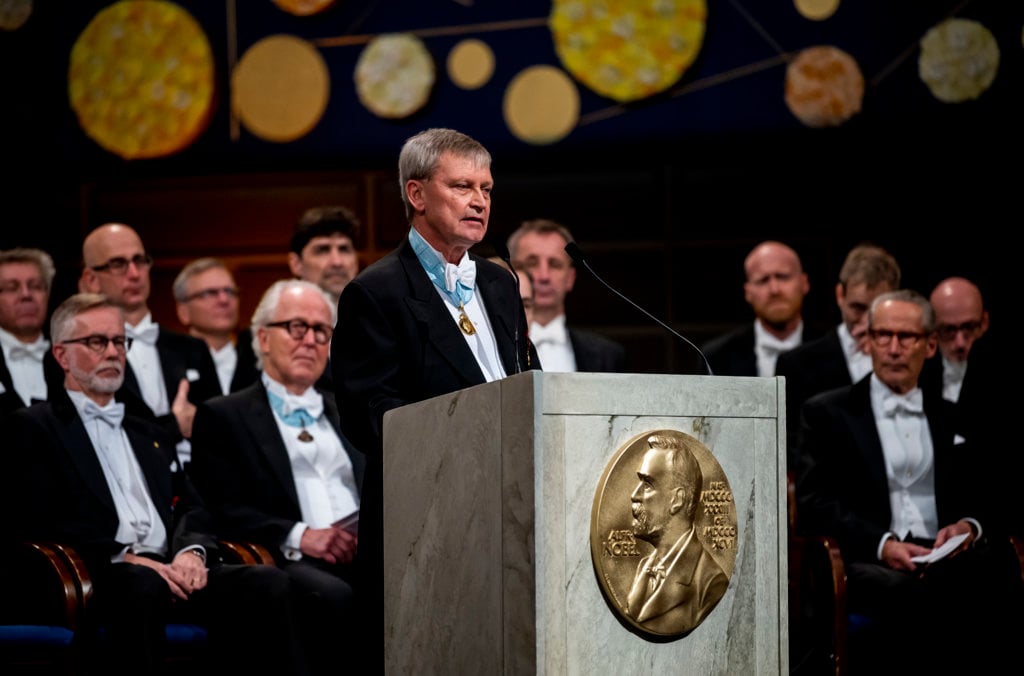The Nobel Prize Award Ceremony 2019

Professor Carl-Henrik Heldin delivering the opening address during the Nobel Prize Award Ceremony at the Stockholm Concert Hall on 10 December 2019.
© Nobel Media. Photo: Alexander Mahmoud
Speech by Professor Carl-Henrik Heldin, Chairman of the Board of the Nobel Foundation, 10 December 2019.
Your Majesties, Your Royal Highnesses, Esteemed Nobel Laureates, Ladies and Gentlemen,
On behalf of the Nobel Foundation, it is a great pleasure for me to welcome you all to this year’s Nobel Prize Award Ceremony. In particular, I would like to wish the Nobel Laureates and their families welcome to this ceremony.
Earlier today, in Oslo, Abiy Ahmed Ali, prime minister of Ethiopia, was awarded the Nobel Peace Prize “for his efforts to achieve peace and international cooperation, and in particular for his decisive initiative to resolve the border conflict with neighboring Eritrea”. His courageous initiative shows that one individual can make a difference and even, in a relatively short time, help bring a decades-long conflict to an end.
Today we are celebrating the Nobel Laureates and their outstanding achievements in science, literature and peace. Their impressive accomplishments are the result of innovative ideas and hard work, and serve as inspiration for us all. That is what Alfred Nobel wanted with his prize.
Alfred Nobel, was himself a scientist and innovator who had laboratories in all his homes. He was full of ideas and obtained over 300 patents during his lifetime. He was a strong believer in the importance of research; only on the basis of facts could the world make real progress. Sadly, Alfred Nobel’s optimistic view is today being challenged all over the world and we see leading politicians who now and then deny facts. Irrational thinking and narrow-minded views are gaining grounds at the expense of scientific achievements, knowledge and rational thinking.
A flagrant example of what we face is lack of respect for the overwhelming evidence demonstrating that our lifestyle negatively affects our climate. When young people stand up and demand that we all listen to science and act, they deserve our support.
As important as defending the application of science to specific issues – such as climate change – is the defence of the scientific method as such. For thousands of years humanity made advancements, but they were slow. It was not until we started to formulate hypotheses and test them against evidence, often empirical, that progress could be made at a faster speed. To quote Carl Sagan “There are many hypotheses that are wrong. That’s perfectly all right; they are the aperture to finding out what is right. Science is a self-correcting process. To be accepted, new ideas must survive the most rigorous standards of evidence and scrutiny.” This requires academic freedom, resources, and arenas and institutions where to work and meet. This we need to defend.
Of course, scientific progress is not without risks. Alfred Nobel invented dynamite and thereby provided safe explosives. They have been, and are, used for the benefit to humankind, for example in the building of roads and tunnels. However, explosives can also be used in destructive, non-peaceful ways. As we all know, this is true also for the splitting of the atom. Another example is modern genetic techniques, which offer exciting possibilities, but also pose important ethical concerns. It is an important duty of scientists to keep the general public well aware of scientific progress, assist in the formulation of appropriate ethical guidelines, and provide legislators with the information they need to install appropriate laws. This should be part of the “contract with society”.
Scientific work requires knowledge, that is obvious. But knowledge is needed more broadly; it is fundamental for our democratic societies. We all have the right to speak up. All voices count. But it is only through discussions based on knowledge that new insights will be gained. Our democracy requires respect for the process, for the arenas where we meet and for the dialogue. For the survival of our democratic systems, and for the other challenges we are confronted with, a good education system and high-quality schools for all are essential are essential.
Ranging from oxygen levels in cells, to planets in new solar systems and ways to alleviate poverty, the discoveries of this years’ laureates show an impressive breadth. However, they still clearly centre around the core values of the Nobel Prize; rational thinking, humanism and co-operation across borders – values that are as relevant as ever before. And they cannot be taken for granted. We all need to engage and contribute. In this the Nobel Prize can play a role. Only through continued struggle can humankind keep improving itself, its society and its environment.
Your Majesties, Your Royal Highnesses, Esteemed Nobel Laureates, Ladies and Gentlemen! Once again, very welcome to today’s Nobel Prize Award Ceremony!
Copyright © The Nobel Foundation 2019